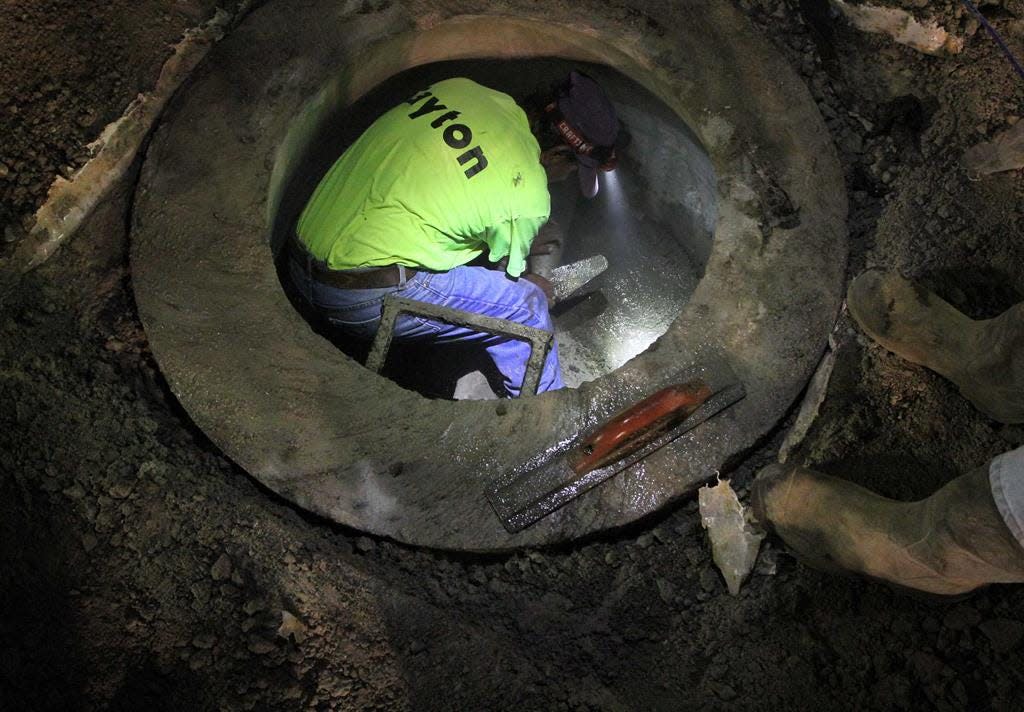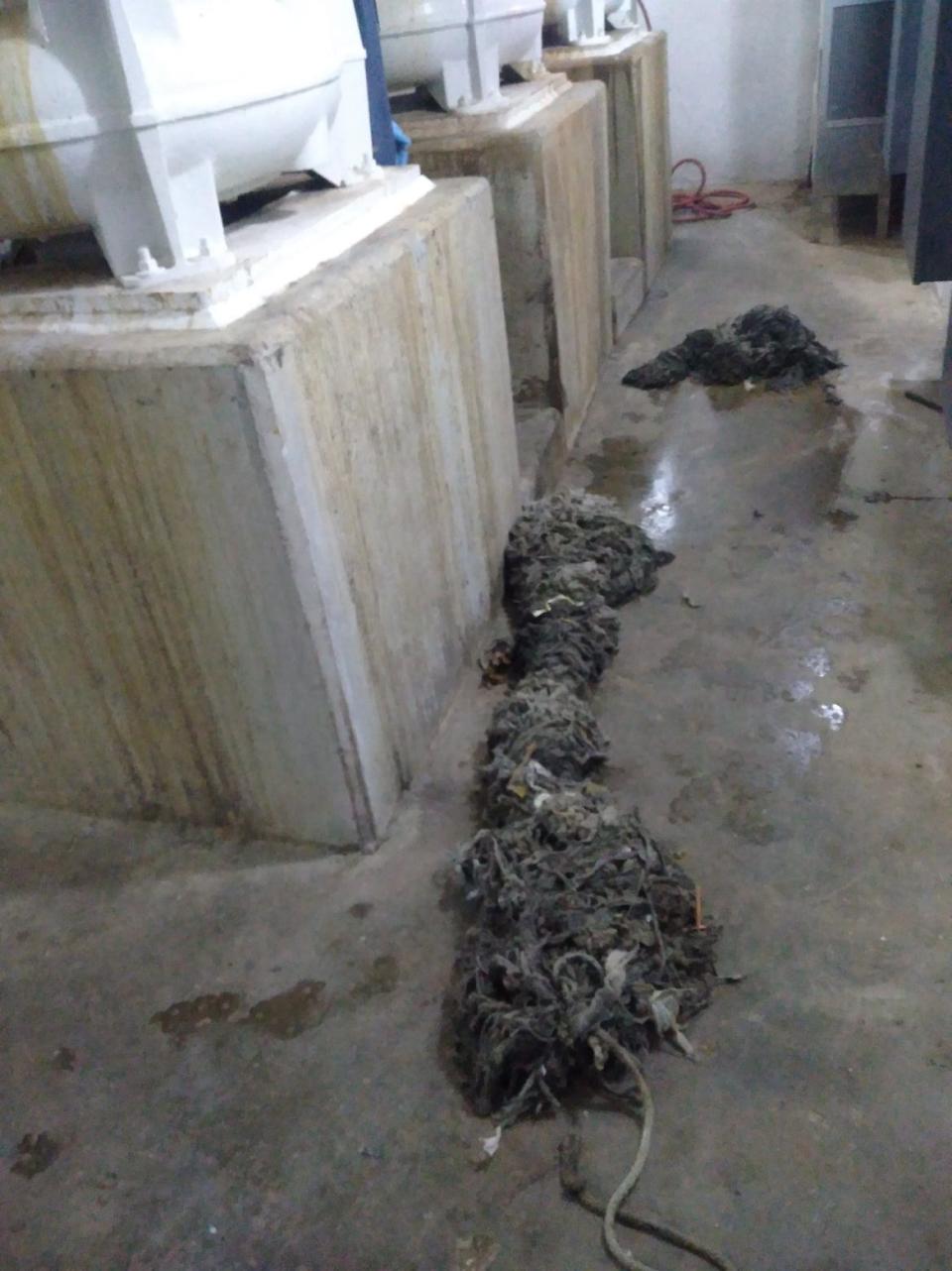Fats, oils, grease and 'flushable' wipes cause a clogging mess in New Bern's sewer system

- Oops!Something went wrong.Please try again later.
If you have made pouring grease down the drain or flushing some not so "flushable" wipes a habit, you may not know the potential unsanitary nightmare that may appear.
Fats, oils, grease, paper towels and flushable or baby wipes found within drains are some of the main contributions to serious problems for New Bern's sewer system. The result could be a massive, reeking mess.
Just last month, the city discovered a 10 foot long and several-hundred-pound clog that was a combination of paper products and grease. Most wipes labeled "flushable" are misleading and not easy to break down once flushed, said Jordan Hughes, New Bern's city engineer.
"Fats, oils, and grease that are poured down the drain will harden again once in the sewer system and in many cases will act as a glue that binds paper products together," Hughes said. "And the combination can cause some very large clogs like the one we removed from the city’s sewer system this past February."

A recent video made by Colleen Roberts, New Bern's public information officer, and Sara Rhodes, pretreatment coordinator, informs locals on how to prevent sewer backups. The video emphasizes there are only three things that should be flushed: number one, number two and toilet paper.
Local: 'Bigger and better' service for Craven County veterans on the horizon
New Bern's wastewater treatment crews try to keep the city's pipes flowing free. Hughes said there are 440 miles of sewer pipes in New Bern they have to maintain and the water resources team works 365 days to prevent clogs from forming. Although, blockages are still a frequent issue.
"Even with this effort, we will have pipelines that get blocked from time to time and these blockages need to be cleared," he said. "Basketball-sized clogs are fairly common and very large clogs like the one in February are experienced every few years."
Especially uncommon items that have been found in the city's sewer system are shoes, cell phones and children's toys, Hughes said.
"Basically, if it will fit in the toilet, someone has probably tried to flush it at some point in the past," he added. "And if they do manage to flush it, we have to deal with it in the sewer system."
The cost for clearing blocked sewer pipes isn't cheap and the amount varies depending on the size and location of the clog. Hughes said blockages can usually be cleared by a vacuum and rodding truck, without the need to perform any repairs.
Though, large blockages can cause damage to pumping equipment, totaling $50,000 to $100,000 in repair cost.
The same expensive repair cost and drain damages can form from residential septic tanks, even if the home's drainage is also on a sewer line, said Brandon Braxton, co-owner of Braxton Septic Tank Service in Vanceboro.
"The biggest thing is just not getting those (septic tanks) serviced on a maintenance schedule like they should," Braxton said. "The longer you go without pumping the tank, the more likely you are to have a problem. And the longer that goes, the likelihood of it being a bigger problem increases as well."
Similar to sewer systems, problems that arise in septic tanks are from pouring or flushing items that don't belong.
Braxton said he suggest pumping your septic tank every three to five years. If a maintenance schedule is not formed, your home could become a flooded unsanitary mess it could also dent your pockets.
"Instead of pumping it out for $300 or less, if you were to cause major problems with the drain lines then you could be looking at $5,000 to $15,000 ... It happens all the time," he said.
Key things to remember to keep your pipes flowing
Blockages in sewer lines can lead to unsanitary conditions in your home. The whole sewer system could shutdown if you ignore the signs of a clog, leaving nothing able to drain inside your residence, Braxton said.
The easiest way to prevent problems in your pipes and the city's sewer system is to never let fats, oils, grease, unnecessary paper or plastic products and anything else other than toilet paper to make its way down the drain. These items do not break down in sewer lines, Hughes said.
Another major tip is there really is no such thing as a flushable wipe, he added, no matter what the label says, don't flush wipes. Several lawsuits, such as one previously settled in Charleston, South Carolina, caused wipe manufacturers to change their labeling from "flushable" to "do not flush."
Lastly, never ignore the signs of a back up. If you hear gurgling noises or sounds that plumbing may make, that's usually a sign of a blockage forming, Braxton said. Any surface water on the ground can also be a reason for concern, so maintenance is always the best solution, he said.
"You may have issues that you don’t see," he added. " A lot of people don't think about it until it is a problem."
Reporter Symone Graham covers local public safety for the Sun Journal. Have a story tip or idea? Send it her way at sgraham@gannett.com.
This article originally appeared on Sun Journal: How to prevent clogs and back ups in New Bern's sewer system

